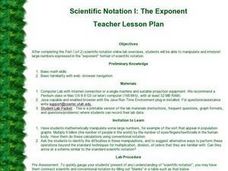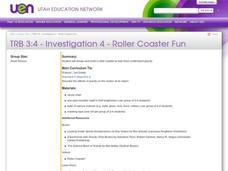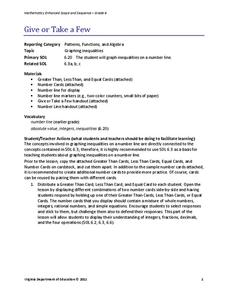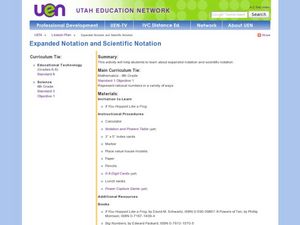Curated OER
How Big Is That Star?
Aspiring astronomers study stars. They compare stars and explain the relationship between radius, mass, and diameter. By creating a star simulation, they discover how a binary star system's orbit can cause changes in the observed...
Teach Engineering
Light Intensity Lab
Let there be light. The last installment of a seven-part series has pupils conduct an experiment on light attenuation through different numbers of transparency sheets. They then relate the results back to how X-rays measure bone density.
Curated OER
Make Your Own "Weather" Map
Pupils create their own "weather" map using data from x-ray sources. They analyze and discuss why it is important to organize data in a fashion in which is easy to read. They compare and contrast different x-ray sources using a stellar map.
Curated OER
Understanding Angles
In this geometry worksheet, students identify the different measure of each angle. They rotate the rays around and make observations about the angles formed. There are 15 questions and lots of examples.
Curated OER
Tennis Balls in a Can
Make your classroom interesting by teaching or assessing through tasks. Deepen the understanding of Geometry and motivate young mathematicians. The task uses investigation with tennis balls and their container to prompt learners to...
Curated OER
Scientific Notation I: The Exponent
Students manipulate and interpret large numbers expressed in the "exponent" format of scientific notation.
Curated OER
Scientific Notation II: The Mantissa
Students after completing the Part II (of 2) scientific notation online lab exercises, manipulate and interpret large numbers expressed in the "mantissa and exponent" format of scientific notation.
Curated OER
Close Enough?
Students examine how navigation is based on mathematics and how making a mistake in measuring an angle could have an impact on a target. They observe a teacher-led lecture, use a calculator to complete two worksheets, and participate in...
Curated OER
Roller Coaster Fun
Third graders review the effects of gravity on how objects move. In groups, they design a roller coaster and share it with their classmates. Using materials given to them, they build their roller coaster and let a ball roll on the...
Virginia Department of Education
Give or Take a Few
Young mathematicians extend their knowledge of rational numbers on a number line to graph inequalities by first using number cards to compare rational numbers. They finish by using similar reasoning to graph inequalities on a number line.
Curated OER
Radiation Reassessed
Students investigate the dangers of radiation by exploring recent nuclear tragedies. In this scientific debate lesson, students define the idea of radiation "half life" and determine if low doses of radiation are truly damaging to...
Curated OER
Unit Circle Lesson Plan
Students identify different locations on a unit circle. In this precalculus lesson, students identify the different trig properties and rewrite the equation of a circle in standard form. They use mnemonic devices to help them...
Pennsylvania Department of Education
Rotational Symmetry of Polygons and Other Figures
Students explore geometry by participating in a shape rotation experiment. For this symmetry lesson, students identify the term symmetry and a list of other geometry vocabulary. Students analyze shapes as they are turned 90 degrees and...
Curated OER
Represent Rational Numbers
Students identify expanded notation and scientific notation. In this rational numbers lesson, students use a calculator to discover the powers of 10. Students practice writing numbers in expanded notation using powers of 10. Students...













